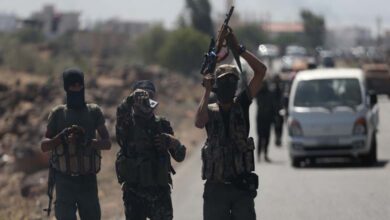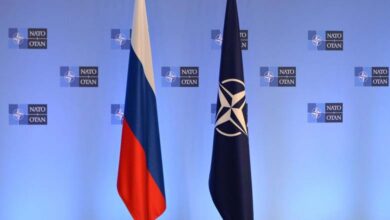Damascus Issues Final Warning to Unify All Weapons Under State Authority

The Minister of Defense urges small armed groups to integrate into the ministry within ten days, warning that delays will trigger legal consequences.
Syrian authorities on Saturday gave “small groups” a ten-day deadline to join the Ministry of Defense. This move is part of a broader effort to unify the numerous armed factions under state control — a serious attempt to reassert dominance over all Syrian territory, which continues to face severe security challenges following the fall of Bashar al-Assad’s regime.
-
Syrian Coast Events: Commitment to “Accountability” and Arrest of Suspects
-
The Fate of Syrian Officers in Iraq Depends on Agreements with Syria
The strategic significance of this ultimatum lies in its role as a decisive test of the new leadership’s ability to assert sovereignty and consolidate fragmented military and security forces. The response from these smaller factions will reveal their true readiness to align with the state and accept the authority of the new leadership. Conversely, any hesitation or outright refusal may signal ongoing fragmentation and security chaos that continues to hinder Syria’s post-conflict recovery.
The actions taken by Syrian authorities in the event of non-compliance will serve as a key indicator of their seriousness and strength in pursuing their goal of ending independent armament and establishing control over all national territory.
-
Syrian Kurds Plan to Empty Jihadist Camps by the End of the Year
-
Security Chaos Returns to Syrian Regions… Hayat Tahrir al-Cham Members Top the List of Accused
Defense Minister Merhaf Abouqasra stated, “Immediately after the liberation of Syria, we began integrating military units into a unified institutional framework,” emphasizing that “all units have been incorporated into the Ministry of Defense.”
He added, “Given the importance of institutional organization, we stress that all remaining small armed groups must join the ministry within ten days from the date of this announcement.”
While framing the move as a continuation of unification efforts, he warned that “any delay in this regard will necessitate appropriate measures under the applicable laws.”
-
Washington Navigates the Syrian “Minefield”
-
Armed factions have become a key player in the Syrian landscape – Details
Abouqasra did not specify which groups have yet to join the ministry, nor what specific actions might be taken if the deadline is missed.
Roughly two months after al-Assad’s ouster on December 8, the new leadership under President Ahmad al-Sharaa announced the dissolution of the former regime’s military and security apparatus.
All armed factions were also disbanded, including Hayat Tahrir al-Sham — the group once led by al-Sharaa in Idlib (northwest), which spearheaded the campaign to depose Assad.
-
Landmines and Unexploded Ordnance: Obstacles to Syrians Returning Home
-
Aleppo Clashes: Syrian Army “Cleanses” Several Areas and Prepares for a Counterattack
Subsequently, factions that agreed to disband were integrated into the Ministry of Defense. The authorities also launched recruitment efforts to form a new General Security Service.
Groups from Daraa (south), others backed by Ankara in the north, and Islamist factions such as Jaysh al-Islam — which once dominated Eastern Ghouta until their 2018 withdrawal — were brought under the ministry’s umbrella.
However, these groups retained their weapons and continued operating from their original headquarters, with some units guarding former military compounds.
-
Meager Salaries and Stark Discrimination: Why Are Syrians Defecting from Iranian Militias?
-
Betrayal and Corruption Plague Syrian Opposition Army
Despite these steps, Hayat Tahrir al-Sham and allied Islamist factions still maintain dominant security influence, especially in Idlib and in the capital, Damascus.
The new Syrian leadership faces major security challenges, including the presence of multi-loyalty armed groups and areas lacking popular support.
-
SDF Fights Syrian Army, Calls on Coalition to Combat ISIS
-
The Syrian Democratic Forces Imposes Curfew in Deir ez-Zor as Battles Escalate with Tribes
The most significant challenge remains in northeastern Syria, where Kurdish fighters present a major obstacle to unification efforts. Although an agreement was signed to incorporate Kurdish autonomous institutions into the state structure by year-end, Kurds continue to demand a decentralized system — a demand rejected by al-Sharaa — while seeking to retain their well-trained armed forces.
Foreign Minister Assad al-Sheibani warned on Monday that any “delays” by the Kurdish-led Syrian Democratic Forces in implementing the agreement would only serve to “prolong the chaos” in the country.












